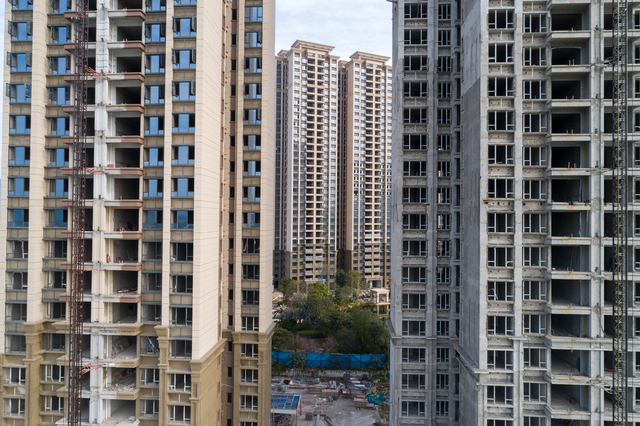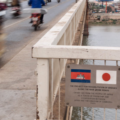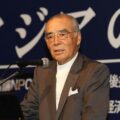Murder of Boy at Japanese School in China: A Turning Point in Japan-China Relations?

China’s economy continues to slow down due to the effects of the real estate bubble burst and the COVID-19 pandemic. Migrant workers from rural areas who have supported China’s growth are finding it difficult to find work at apartment and building construction sites. They are becoming increasingly dissatisfied with their predicament, and are even causing trouble.
Photo: lzf / PIXTA
The murder of a boy attending a Japanese school in Shenzhen, Guangdong Province, China in September 2024 has had a great impact on Japanese society, especially on Japanese people with ties to China. Along with the school bus attack incident in Suzhou, Jiangsu Province, in June of the same year, I, who have lived in Beijing and Shanghai as a correspondent for The Aasahi Shimbun (Japanese daily newspaper) and have covered China for a quarter of a century, cannot help but feel strong anger, indignation, and sadness. What is the pathology lurking in Chinese society behind this incident? Why is it directed against Japan? I would like to discuss the current state and future of Japan-China relations that the incident has highlighted.
A series of random killings
“Xianzhong.”
This refers to Zhang Xianzhong (1606–1647), one of the leaders of the peasant rebellion at the end of the Ming Dynasty (1368–1644) in China. He is said to have favored large-scale massacres in battle. In recent years, his name has been used on the Chinese-language Internet as a slang term for indiscriminate attacks and killings of people dissatisfied with society. Currently, if you search for him on the Chinese search system Baidu, you will not find any explanations other than the historical facts. According to a professor at a university in Beijing, the Chinese authorities are afraid of the spread of copycat crimes, so they have made it a taboo word in this sense.
Chinese society has become increasingly vigilant against random killings since the COVID-19 pandemic. There have been a number of incidents in which men with knives have attacked subways, streets, shopping malls, kindergartens, schools, and hospitals. An acquaintance of mine who has a boy in elementary school and lives in Shanghai said, “I hear that kidnappings and murders of children from wealthy families are on the rise. I don’t think everything is reported, so I’m even more worried. There are many families who drive their children to and from school.”
The background is first of all the slowdown of the Chinese economy. The days of gross domestic product (GDP) growth of around 10% per year are long gone. The real estate bubble has burst, and even after the COVID-19 pandemic, the economy has struggled to recover, especially in regional cities. It is unclear whether the economic growth target of 5% in 2024 will be achieved. Unemployment among young people (aged 16–24, excluding university students) is close to 20%. Looking only at official Chinese government statistics, one in five people cannot find a job even if they are looking for one.
In June 2024, there were random killings in a subway station in Shanghai, in a supermarket in the same city in late September, and outside a primary school in Guangzhou in October. According to Chinese media reports, the common denominator among the perpetrators was that they were migrant workers who had come to the city from rural areas and lost their jobs. In the past, if you lost your job in China, you would return to your hometown to work in agriculture, or you would stay in the city and look for work while receiving unemployment insurance. It was not difficult to find work on housing and construction sites. However, since the collapse of the real estate bubble, such opportunities have been drastically reduced. In addition, many of the perpetrators have criminal records, but strict ID (identity) management using digital technology tends to block the path to rebuilding their lives.
A Japanese economist living in Beijing points out, “During the long period of rapid economic growth, Chinese society has somehow managed to function even with the gap between rich and poor and without a safety net for the weak. From now on, it won’t be easy. The second generation of migrant workers, born and raised in cities, is worse off than the first. Even if they return to the countryside, they have no farming experience and may end up homeless. We are likely to see an increase in crimes caused by financial hardship.”
A suffocating surveillance society, deepening pathology
What will the economic slowdown do to Chinese society?
This is a topic that has been discussed in neighboring Japan for many years. A Japanese diplomat who has been involved in diplomacy with China for a long time looks back and says: “One of the reasons why Japan has continued to provide economic aid to China was that we thought it was in Japan’s national interest to have a prosperous China rather than to have people in poverty flocking to Japan in search of work when the economy becomes unsustainable.” This has also given China an excuse to turn a blind eye to serious human rights violations, such as the Tiananmen Square incident (1989), and prioritize economic ties.
If China’s bubble economy bursts, public discontent will grow, unrest will spread, and the Chinese Communist Party (CCP) regime will be shaken. Around 2000, when I started covering China, many experts at home and abroad thought this would happen. What is the current situation? The Chinese government has built an advanced surveillance system with the world-class technology it has acquired through its rapid growth. Demonstrations by people dissatisfied with the environment, land expropriation, pensions, and ethnic minority policies, which were once common, have been suppressed. It is true that the minimum wage has risen and people’s lives have become more prosperous than before, but it is difficult to say that discontent has disappeared. Such dissatisfaction has been lurking in society.
After the lockdown due to the COVID-19 pandemic, some people who are dissatisfied with the stifling atmosphere of the thoroughly controlled society under the Xi Jinping administration have left their homeland and traveled abroad, including to Japan. Meanwhile, those at the bottom who lack financial and social resources are being pushed into a corner. The Xi administration has cracked down on corruption among officials, in part to eliminate political opponents, in an attempt to ease ordinary people’s discontent with those in power. However, the system for distributing wealth from the rich continues to be neglected. There is no inheritance tax, and property taxes are inadequate. Labor unions are also government-created, and opportunities for workers to raise their voices are closed. Where does the discontent of the weak go, who have no economic power, no social standing, and no political power to appeal to, in other words, who have nothing to lose? Some of them even target children or sick people who are even weaker than themselves — these violent incidents known as “Xianzhong” can be said to be the very pathology of Chinese society.
The message of ignoring “anti-Japanese rumors”
However, the series of incidents targeting children attending Japanese schools in Suzhou and Shenzhen cannot be explained by this “pathology” alone. Why were Japanese students targeted when there are many other foreign students attending the school?
The direct cause is believed to be the recent spread of false rumors on the Chinese Internet that Japanese schools are “spy training institutes,” which have created ill feelings toward the Japanese people. The Japanese Embassy in Beijing has repeatedly requested that such false statements be deleted, but the Chinese authorities have ignored it and left them.
When discussing this issue, it is a valid point to say that asking the government, a national authority, to police and manage online speech is a response that goes against the freedom of speech that is the foundation of democracy. Of course, in any country’s online space, information that is a mixture of facts and lies is flying around. However, China’s online space is in an extremely unique environment. Under information control that does not allow diverse speech and only allows reporting that is in line with the government’s intentions, it can be said that the authorities and netizens are playing a unique “game.” Stories inconvenient to the CCP and government are deleted on a daily basis.
The Chinese Internet is full of taboo words, not only on political topics such as the Tiananmen Square incident, the democratization movement, and criticism of the Party leadership, but also, more recently, to point out problems in China’s economic situation. These words even include indirect expressions such as “Winnie the Pooh,” which is used to mock President Xi, and tanks and the date (June Fourth or 64), which are reminiscent of the Tiananmen Square incident.
What does it mean for Chinese netizens that the authorities have left information in this space that “Japanese schools are spy training institutes”? For the netizens, as this is a phrase officially approved by the authorities, it is recognized as information that can be handled freely and disseminated. It doesn’t matter if it’s true or not for them. It is doubtful whether the people who post it actually believe it. They can report it in a funny way, get views and make money. In this way, “anti-Japanese and patriotic content” is consumed in cyberspace. Naturally, as this information spreads, some Internet users believe the rumor.
The background to the cause is not limited to issues with Japanese schools (the spy training institutes theory). The Shenzhen incident took place on September 18. It was on the same day in 1931 that the Liutiaohu incident occurred, when the former Japanese army blew up the tracks of the South Manchurian Railway, leading to the occupation of northeast China. Along with the Marco Polo Bridge Incident (July 7) and the Nanjing Massacre (December 13), this day is a commemorative day when nationalism against Japan grows. On such days, local Japanese companies try to avoid events and celebrations that attract large crowds, such as new car launches, so as not to provoke people’s emotions. It was on one of those special days that the incident occurred.
President Xi said at the 19th CCP National Congress (2017) that “the Chinese nation has achieved the tremendous transformation from ‘standing up and growing prosperous’ to ‘becoming strong.’” While Mao Zedong was the one who made the Chinese people “stand up,” Deng Xiaoping was the one who made them “prosper.” And then President Xi himself plays the role of making them “strong.” President Xi puts more emphasis on “national security” than on “opening up.”
Historically, the key to the CCP’s rule has been economic prosperity and nationalism. As mentioned above, while the former is unstable, the latter is even more important. The origin of the legitimacy of its rule is the historical story of leading the country to victory in the war against Japan. Of course, the relationship with Japan has a special significance in promoting nationalism.
In addition, not only criticism and resentment against Japan, but also speeches in China inciting retaliation against Japan as “hatred of Japan” can sometimes be politically used as “public opinion” when the Chinese government confronts Japan. For the Chinese government, runaway anti-Japanese sentiment is troublesome, but it can be a diplomatic tool within the limits of control. This atmosphere between the public and private sectors may lead some weaker people who have been left behind in China’s now powerful society to believe that they can become “heroes” by attacking Japan rather than other countries in retaliation.
Of course, there are many Chinese people who are critical of the Chinese government’s stance. At the scene of the Shenzhen incident, a bouquet of flowers was left with a letter criticizing the “anti-Japanese education.” After the incident, a Chinese researcher who visited Japan was outraged and said, “As a mother, I cannot forgive the perpetrator.” At the same time, the history of Japan’s invasion of China is a fact. Japanese society must remember, reflect on, and examine this process and teach it to the younger generation so that it can become the foundation of peace in the future. Of course, this is an issue that Japan must continue to work on.
However, this [Japan’s reflection] and the demand for transparency from the Chinese government, such as the disclosure of investigation information regarding the incident involving the Japanese school, are fully compatible. Respect for human rights, including the value of human life, and transparency in policy-making are important to prevent China from going down the wrong path that Japan once did.
Undisclosed details of the incident
Despite repeated requests from the Japanese government, the Chinese government has not provided any information on the results of the investigation into the incident or the motive. They just keep repeating that it was “an isolated and individual case,” and “China will handle the case in accordance with law,” “similar cases may happen in any country,” “China is one of the safest countries.” (Foreign Ministry spokesman)
In the case of the stabbing of four Americans in Jilin Province, one of the victims revealed that “the perpetrator was unemployed and in a bad mood when one of the Americans bumped into him as they passed and impulsively stabbed him,” according to Chinese public security authorities. Regarding the murder in a Shanghai supermarket at the end of September, Chinese media reported after the announcement by the public security authorities that “the perpetrator was a migrant worker from Hunan Province who had no money due to unpaid wages and sometimes slept outdoors, and was unable to support himself, so he committed the crime with the intention of taking revenge on society.” It is impossible to confirm whether either story is true. But at least the authorities are telling a story. “The fact that details of the incident cannot be made public makes us suspect that it is aimed at Japanese people,” said a Japanese diplomat.
A Chinese Foreign Ministry official expressed dissatisfaction, saying, “The Chinese side has expressed regret, and many Chinese people sympathize with the victims. Why is the Japanese side so insistent?” Chinese Foreign Minister Wang Yi, in a meeting with then-Foreign Minister Kamikawa Yoko, called on Japan “to view the incident in a calm and rational manner and avoid politicizing and exaggerating the incident.” This seems to mean that they should treat it as a simple murder case, not give political connotations to the background, and not use it to criticize China.
However, as the Chinese government itself has repeatedly emphasized, ensuring the safety of its citizens is the foundation of a nation’s role. The Chinese side’s attitude of not explaining the details of the incident for fear of “exaggeration” has increased doubt and mistrust in Japanese society, which has ultimately led to “exaggeration” of the issue. The temperature difference between Japan and China is too great.
Japanese business circles measuring the distance with China
“After the incident in Jiangsu Province in June, the recent attack on a schoolboy in Shenzhen has shocked the whole of Japan, and we are still in deep sorrow and anger. We are waiting for the motive and other details of the incident to be revealed.”
In anticipation of the 75th anniversary of the founding of the People’s Republic of China, held in Tokyo at the end of September, the speech by Shindo Kosei, chairman of the Japan-China Economic Association and advisor to Nippon Steel, attracted attention. The Chinese side had been reluctant to mention the Shenzhen incident, but the association, one of the seven Japan-China friendship organizations, stepped forward.
From the perspective of Japanese companies, this was only natural. China is Japan’s largest trading partner, and Japanese companies have more than 30,000 bases in China. Issues related to the safety of Japanese people working in China cannot be ignored.
In Japan-China relations, the economy has always been the glue that binds the two countries, compared to areas of constant conflict such as historical recognition, military affairs, and security. The attitude of the business community, which has played such a key role, is now changing. The incidents in Suzhou and Shenzhen could be a major turning point in Japan-China relations. In fact, they could be said to have occurred at a time when the relationship is reaching a turning point.
“Sayonara (Goodbye).” A bar graph with this title appeared in the September 28, 2024 issue of the British magazine The Economist, along with an article reporting on the Shenzhen incident. The article showed the trend in the number of Japanese residents in China and noted that the incidents were devastating the Japanese community, which was already shrinking.
This year, the number of Japanese living in China is likely to fall below 100,000 for the first time in about 20 years, since 2005. It peaked at 150,000 in 2012. Last year, it fell to 101,786, almost two-thirds of the previous number. In response to this incident, some expatriates have begun to send their families back to Japan. In addition, there are strong voices of hesitation about new postings and studying abroad.
After reaching a record high of $12.5 billion in 2021, Japan’s direct investment in China halved to $5.6 billion in 2022, and then fell to $3.8 billion in 2023, down more than 30% from the previous year. According to a survey by the Japan External Trade Organization (JETRO), Japanese companies’ desire to expand their business in China is also at an all-time low since the comparable survey in December 2013, with only 33.9% of companies looking to expand existing businesses or considering new ones. This is due to the slowdown in the Chinese economy, as well as the fact that Chinese companies in sectors such as the auto industry have grown into competitors and are no longer an easy place to make money. In addition, the reasons are complex, including the fact that the US-China conflict, which is expected to continue for a long time, the war in Ukraine, and the implementation of the Counterespionage Law under the Xi administration have forced China to take national risks more seriously than before. This incident will undoubtedly accelerate this trend.
After the summit between then Prime Minister Kishida Fumio and President Xi in November 2023, a series of Chinese delegations, mainly from regional cities, visited Japan. Communist Party secretaries or provincial leaders from Liaoning, Jiangsu and Fujian provinces visited Tokyo one after another, surprising the Japanese business community. The purpose was to attract investment from Japanese companies. In mid-November 2024, the Japan-China Energy Conservation and Environment Forum was held in Tokyo for the first time in about five years, with several hundred Chinese delegations in attendance.
In response to the slowdown in economic growth, China is actively seeking business opportunities with foreign countries, including Japan. In response, a senior official of a Japanese business organization acknowledged that “Chinese visits are of course welcome. It is important to meet face-to-face and exchange views, as this will make business smoother and ensure the safety of local employees. But the enthusiasm is not as strong as in the past, when there was a strong desire not to lose the huge Chinese market at any cost.” As Japanese expatriates in China begin to feel unsafe for themselves and their families, they are more interested than ever in the Chinese government’s disclosure of information about incidents and its response to human rights issues. For those stationed in China, such issues and problems are no longer someone else’s concern. China’s “pathology” also reflects the “pathology” of Japanese society, which has overlooked the state of human rights and democracy in neighboring China. There is no denying that this was due to a psychological fear that Japan’s own wartime mistakes would be refuted.
How should we deal with a neighboring country that has “grown stronger”?
Not only has the “heat” in the business world, which has been the glue that has held Japan-China relations together, waned. China studies experts, especially in the political field, are also becoming less willing to go to China. Following the detention of a Hokkaido University professor by Chinese authorities (2019), opposition to traveling to China has grown not only among people traveling to China, but also among their families. The methods used by Japanese scholars to conduct in-depth research in rural areas are also becoming more difficult due to China’s wariness. Japanese politicians are also reluctant to engage with China due to worsening feelings toward China in Japan, and there has been little progress in the generational change in the leadership of friendship organizations.
Despite their conflicts with China, Western countries continue to receive visits from leaders and ministers. The same goes for companies, with the heads of Apple and Volkswagen visiting China, and in the academic field, Ian Bremmer from the United States also visited China in October 2024. Exchanges between Japanese people and Chinese people who have left their native China and chosen Japan as a place to live have become deeper than ever before. This can be regarded as a new phenomenon. However, it must be said that the information that Japanese people have gained by actually visiting China and seeing it with their own eyes is dwindling compared to the information that Westerners have gained.
In the 21st century, Japanese society experienced large-scale anti-Japanese riots in 2005 and 2012. I also covered the incidents there. Stones and plastic bottles were thrown at the Japanese embassy, and the Japanese flag was burned. Japanese cars and Japanese restaurants were destroyed, and a Japanese department store was set on fire. A Japanese living in Beijing who remembers the incidents at the Japanese school said, “In a way, we are used to Japan being targeted. Nevertheless, the Japanese community in China is feeling a greater shock than it did then. In the past, it was understood that the protests were mobilized and controlled by the CCP, and that there were riots outside of that. This time, however, with the economy faltering, there is concern that malice that the Chinese authorities cannot control may be directed at the lives of Japanese people. I do not recommend that people bring their families to China to work there.” He is the same person who criticized me in 2012 for “exaggerating” the anti-Japanese demonstrations. This time he says, “Both the Japanese government and the media should strongly demand that information about the incidents be disclosed.”
In 2005, when the anti-Japanese riots broke out, China’s economy was a quarter the size of Japan’s. By the time of the subsequent riots in 2012, China’s economy was about the same size as Japan’s, but it has now surpassed Japan’s and is four times larger. To what extent does China recognize Japan’s concerns about its larger, more powerful neighbor, which could be described as “China fatigue”? As Japan communicates these concerns to China, is it able to assess the realities of Chinese society, which is constantly changing?
Even if Japan turns its face away, its neighbor China is still there. Japanese society is being tested for its resolve to continue to face difficult challenges.
Translated from “Nihonjin-gakko Danji Satsugai-jiken — Nicchukankei no Tenkika (Murder of Boy at Japanese School in China: A Turning Point in Japan-China Relations?),” Sekai, December 2024, pp. 48–54. (Courtesy of Iwanami Shoten, Publishers) [January 2025]
Keywords
- Yoshioka Keiko
- Asahi Shimbun
- Japan-China relations
- turning point
- murder
- Japanese school
- information disclosure
- Shenzhen
- school bus attack
- Suzhou
- “Xianzhong”
- random killings
- Chinese-language Internet
- economic slowdown
- unemployment
- migrant workers
- surveillance society
- controlled society
- suppression
- Xi Jinping administration
- pathology
- anti-Japanese rumors
- “spy training institutes”
- Japanese residents in China
- direct investment





